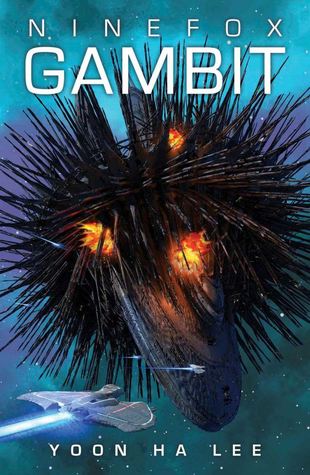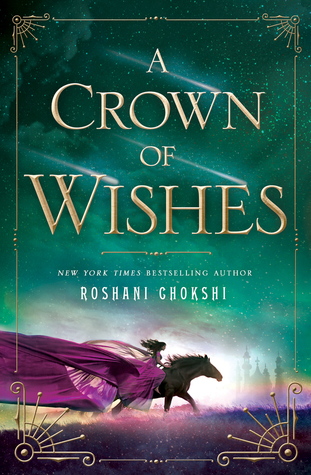Ninefox Gambit, The Machineries of Empire #1
by Yoon Ha Lee
rating: ☆☆☆
published: 6th April 2017
spoilers? no
Goodreads
tw for implied rape in a flashback scene, implied suicide attempt, suicidal thoughts
Around 270 pages into this book, having skimread a few I'll admit, I was fully prepared to rate this book 2 stars. Up until then, it had been not all that interesting, bordering on tedious, with the only real bright spot being Jedao and Cheris' interactions, and the fact that Cheris is a wlw.
The book is essentially an extended battle scene, full of pages of tactical considerations. Some of these tactics are related to battle formations, which are computed using complex mathematical calculations, and the fact that every time one was used, Yoon Ha Lee went into a lot of detail about them, the book was slowed down immeasurably. Added to the fact that you just get dropped into this world with zero explanation of how it works, and that it's actually a very complex world for a sci-fi book, I found it hard to get into.
It took me a good while to understand that this Empire was underpinned by a specific, mathematically-derived calendar, and that any deviations from this calendar (presumably made by computing something new) were heretical. On top of that, there are six factions, each charged with a different aspect of life - much like Divergent. For example, the Kel - the faction Cheris belongs to - are the foot soldiers (and pretty much cannon fodder). In the past, the seventh faction, the Liozh, had turned heretic and so were destroyed. All this would have been helpful to know from the start, but I can understand why the author might not want to add a whole section explaining the world - it often makes the beginning clunky and unrealistic.
So, as I said, this book was heading towards a two star review from me, when the last 40 pages happened.
This is one of those books that sets you up so you think you know everything for about 90% of the book and then in the last 10% is like ha lol played you. Those last 40 pages alone were enough for me to boost the rating by one star (I was tempted to rate it 4 stars actually because they even made me look back in fondness on the 270 preceding pages of tediousness) and to want to read the next book. I think that if I now went back and reread this book, I would enjoy it a lot more.
On top of this, no one in this entire universe is straight. Cheris has only ever had female lovers, Jedao has had both male and female lovers, and they're also explicitly attracted characters of the same gender. A lot of the time it feels like authors don't necessarily write that part of the LGBT character, but Yoon Ha Lee does (Cheris more than Jedao in this book, but only because it's more like her POV - Jedao gets his turn in the short story prequels). In addition, in the short story Extracurricular Activities, there's a character who uses they/them pronouns.
In the end, this was a good book. I just wish I had enjoyed it right from the start.
by Yoon Ha Lee
rating: ☆☆☆
published: 6th April 2017
spoilers? no
Goodreads
tw for implied rape in a flashback scene, implied suicide attempt, suicidal thoughts
Around 270 pages into this book, having skimread a few I'll admit, I was fully prepared to rate this book 2 stars. Up until then, it had been not all that interesting, bordering on tedious, with the only real bright spot being Jedao and Cheris' interactions, and the fact that Cheris is a wlw.
The book is essentially an extended battle scene, full of pages of tactical considerations. Some of these tactics are related to battle formations, which are computed using complex mathematical calculations, and the fact that every time one was used, Yoon Ha Lee went into a lot of detail about them, the book was slowed down immeasurably. Added to the fact that you just get dropped into this world with zero explanation of how it works, and that it's actually a very complex world for a sci-fi book, I found it hard to get into.
It took me a good while to understand that this Empire was underpinned by a specific, mathematically-derived calendar, and that any deviations from this calendar (presumably made by computing something new) were heretical. On top of that, there are six factions, each charged with a different aspect of life - much like Divergent. For example, the Kel - the faction Cheris belongs to - are the foot soldiers (and pretty much cannon fodder). In the past, the seventh faction, the Liozh, had turned heretic and so were destroyed. All this would have been helpful to know from the start, but I can understand why the author might not want to add a whole section explaining the world - it often makes the beginning clunky and unrealistic.
So, as I said, this book was heading towards a two star review from me, when the last 40 pages happened.
This is one of those books that sets you up so you think you know everything for about 90% of the book and then in the last 10% is like ha lol played you. Those last 40 pages alone were enough for me to boost the rating by one star (I was tempted to rate it 4 stars actually because they even made me look back in fondness on the 270 preceding pages of tediousness) and to want to read the next book. I think that if I now went back and reread this book, I would enjoy it a lot more.
On top of this, no one in this entire universe is straight. Cheris has only ever had female lovers, Jedao has had both male and female lovers, and they're also explicitly attracted characters of the same gender. A lot of the time it feels like authors don't necessarily write that part of the LGBT character, but Yoon Ha Lee does (Cheris more than Jedao in this book, but only because it's more like her POV - Jedao gets his turn in the short story prequels). In addition, in the short story Extracurricular Activities, there's a character who uses they/them pronouns.
In the end, this was a good book. I just wish I had enjoyed it right from the start.







